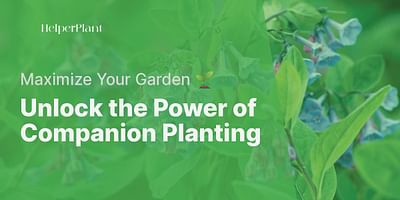Hadley is an experienced horticulturist with a gardening career spanning over two decades. She holds a deep interest in companion planting and continuously indulges in exploring new plant pairings. When not immersing herself in the world of botany, Hadley can be found enjoying nature trails and indulging in birdwatching.
Companion planting significantly contributes to biodiversity and ecosystem preservation by creating a diverse environment that encourages a balanced insect population, improves soil health, and enhances plant growth. It is a sustainable gardening practice that promotes organic farming and reduces the need for chemical fertilizers and pesticides.
Let's Dive into the Colorful World of Biodiversity with Companion Planting 🌱
Companion planting is a method of planting different plants close together for mutual benefit. This creates a diverse ecosystem within your garden, attracting a variety of beneficial insects and birds. The diversity of plant species helps to protect wildlife and ecosystems by providing habitats and food sources for different creatures. This diversity also discourages pests by making it harder for them to find and destroy a single plant species.

How Your Garden Can Save the World: Ecosystem Preservation with Companion Plants 🌍
Companion planting helps in ecosystem preservation by improving soil health. Different plants have varying nutrient needs and root depths, which prevent the depletion of specific nutrients in the soil. Some companion plants, like legumes, can even fix nitrogen in the soil, providing a natural source of this essential nutrient to other plants. This reduces the need for chemical fertilizers, thus preserving the natural ecosystem.
Popular Companion Plants and Their Benefits to Soil Health
To give you a better understanding of how companion planting contributes to soil health, let's take a look at some popular companion plants and their benefits:
| Companion Plant | Benefit to Soil Health | |
|---|---|---|
| Legumes | Fixes nitrogen in the soil, reducing the need for chemical fertilizers | 🌱 |
| Marigold | Produces a natural pesticide and nematicide, reducing the need for chemical pesticides | 🌼 |
| Comfrey | Deep roots help to bring up nutrients from the soil, benefiting shallow-rooted plants | 🍃 |
| Nasturtium | Attracts beneficial insects and repels pests, contributing to natural pest control | 🌺 |
| Borage | Attracts pollinators and improves soil quality with its deep taproot system | 🌸 |
As you can see, each of these companion plants plays a unique role in improving soil health, thus contributing to ecosystem preservation. In the next section, we'll explore how companion planting supports sustainable gardening.
Grow Green, Stay Green: Sustainable Gardening with Companion Planting 🌿
Companion planting is a cornerstone of sustainable gardening. It reduces the need for chemical pesticides by incorporating plants that naturally repel pests. For example, marigolds produce a scent that deters nematodes and other garden pests. This natural pest control method is not only safer for the environment but also for beneficial insects and birds in your garden.
To illustrate the concept and benefits of companion planting in sustainable gardening, let's take a look at this informative video by 'SG Aust'.
As demonstrated in the video, companion planting not only reduces the need for chemical pesticides but also encourages the growth of beneficial plants, which is our next point of discussion.
Furthermore, companion planting encourages the growth of beneficial plants, including herbs and vegetables, which can improve your garden's yield and flavor. This can help reduce the environmental impact of transporting food from far-away farms.
Harmony in Your Backyard: The Magic of Organic Gardening and Companion Planting 🍅
Companion planting is a key practice in organic gardening. By creating a balanced, diverse ecosystem, it helps to maintain healthy soil, control pests, and foster plant growth without the use of harmful chemicals. This aligns with the principles of organic farming, which aim to work with nature rather than against it.
Organic Gardening and Companion Planting Quiz
Test your knowledge about the benefits of organic gardening companion planting.
Learn more about 🌱 Organic Gardening and Companion Planting Quiz 🌱 or discover other Helper Plant quizzes.
In conclusion, companion planting is a powerful tool for promoting biodiversity and preserving ecosystems. By fostering a diverse, balanced garden environment, you can reduce reliance on chemicals, improve soil health, and contribute to a more sustainable future for our planet.
Let's take a look at an example of a thriving companion garden.
Here, Emily Green demonstrates how companion planting contributes to a balanced, diverse garden environment.















